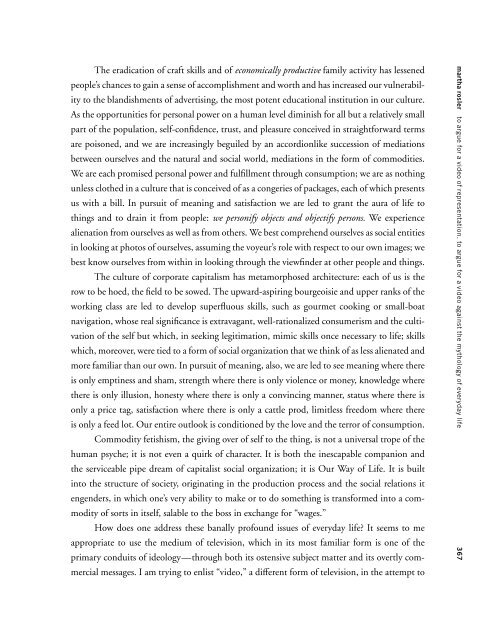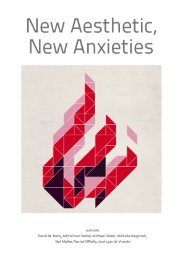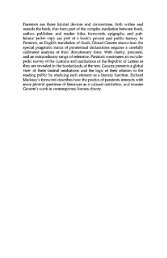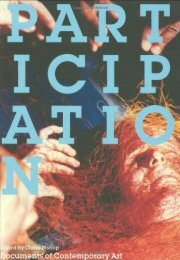- Page 1 and 2:
Conceptual Art: A Critical Antholog
- Page 4 and 5:
conceptual art: a critical antholog
- Page 7 and 8:
contents ILLUSTRATIONS xii PREFACE
- Page 9 and 10:
Rolf Wedewer, Introduction to Konze
- Page 11:
Adrian Piper, On Conceptual Art 424
- Page 14 and 15:
16. General Idea, Orgasm Energy Cha
- Page 16 and 17:
have chosen to include are not mean
- Page 18 and 19:
elements of the artwork as equal co
- Page 20 and 21:
guistic act of asserting their “a
- Page 22 and 23:
model of conceptualism posits an un
- Page 24 and 25:
ody else fabricating or describing
- Page 26 and 27:
an isolated circuit, these works cl
- Page 28 and 29:
communication, integrating the work
- Page 30 and 31:
always already constructed. In othe
- Page 32 and 33:
Atkinson refers to it, compiled in
- Page 34 and 35:
the things only on a verbal informa
- Page 36 and 37:
escape it. The museum can assess in
- Page 38 and 39:
ognition: Representation, Power, Cu
- Page 40 and 41:
and, thereby, of society as a whole
- Page 42 and 43:
In the late sixties and early seven
- Page 44 and 45:
and from the language of painterly
- Page 46 and 47:
transformation”—had been underm
- Page 48 and 49:
out, conceptual art had little of t
- Page 50 and 51:
12. Gregory Battcock, “Painting I
- Page 52 and 53:
in the Labour Movement,” Dialogue
- Page 55 and 56:
eduardo costa, raúl escari, robert
- Page 57 and 58:
a media art (manifesto) eduardo cos
- Page 59 and 60:
4 This text was written in Buenos A
- Page 61:
compositions for audio structures c
- Page 64 and 65:
the attributed signifiers are unant
- Page 66 and 67:
2 Mel Bochner and Robert Smithson,
- Page 68 and 69:
Conceptual art is not necessarily l
- Page 70 and 71:
can be measured. The intervals and
- Page 73 and 74:
excerpt from placement as language
- Page 75:
3 Brian O’Doherty, Scenario for B
- Page 78 and 79:
1 — The derivation of the terms o
- Page 80 and 81:
subtracting each number in turn fro
- Page 82 and 83:
the visual evidence that they do me
- Page 85 and 86:
uren, mosset, toroni or anybody mic
- Page 87 and 88:
emarks on air-conditioning: an extr
- Page 89:
34 NOTES 1. “Other maps are such
- Page 92 and 93:
“reductive” art—simply corrob
- Page 95 and 96:
general scheme of the new objectivi
- Page 97:
42 large-scale, not for an elite re
- Page 100 and 101:
II 1968
- Page 102 and 103:
an “empty” work, or one with a
- Page 104 and 105:
ultra-conceptual. When works of art
- Page 107 and 108:
concerningthe article “the demate
- Page 109 and 110:
54 can never be created or destroye
- Page 111 and 112:
56 rather, questions of true or fal
- Page 113 and 114:
58 and myself worked particularly c
- Page 115 and 116:
statement yvonne rainer The choices
- Page 117 and 118:
statement to lucy lippard hanne dar
- Page 119:
7 John Baldessari, Everything Is Pu
- Page 122 and 123:
gallery or museum signified “this
- Page 124 and 125:
function. It may happen that the ob
- Page 126 and 127:
G. B.: At this stage, art would bec
- Page 128 and 129:
ual. It forces him to have the same
- Page 130 and 131:
8 Martha Rosler, Bringing the War H
- Page 132 and 133:
The recognition of this new concept
- Page 134 and 135:
The artists worked in collaboration
- Page 136 and 137:
III 1969
- Page 138 and 139:
etween the artist and his public re
- Page 140 and 141:
In October 1967 at the Fifth Paris
- Page 142 and 143:
fact eliminated the artist’s “e
- Page 144 and 145:
or listening to gurgling or popping
- Page 147 and 148:
art workers’ coalition open heari
- Page 149:
94 take pictures of each other just
- Page 153 and 154:
introduction editors of art-languag
- Page 155 and 156:
100 and the U.S.A. does not, if the
- Page 157 and 158:
102 The question of “recognition
- Page 159:
104 in various ways stressed the ro
- Page 162 and 163:
10 — Ideas alone can be works of
- Page 164 and 165:
11 General Idea, The Garb Age Colle
- Page 166 and 167:
1 — Language suggests, through th
- Page 168 and 169:
note: start write up of piece when
- Page 170 and 171:
“element” missing from this dia
- Page 172 and 173:
Aug 8, 69 Kent Cunow. Told a great
- Page 174 and 175:
only one who’s not staying in N.Y
- Page 177 and 178:
“maintenance art manifesto: propo
- Page 179 and 180:
124 II. THE MAINTENANCE ART EXHIBIT
- Page 181 and 182:
patron’s statement for “when at
- Page 183 and 184:
politics and the avant-garde piero
- Page 185 and 186:
130 brought into being a climate of
- Page 187 and 188:
132 Emilio Prini states: “creativ
- Page 189 and 190:
134 obstacles continue to call for
- Page 191 and 192:
art tamed and wild jean clay May 19
- Page 193 and 194:
138 In a period of gigantic ephemer
- Page 195:
140 There has been a noticeable inc
- Page 198 and 199:
jects waiting to be turned into an
- Page 200 and 201:
We can distinguish [four] different
- Page 202 and 203:
The points to be examined are descr
- Page 204 and 205:
art that one might think that inner
- Page 206 and 207:
which concerns us is therefore fund
- Page 208 and 209:
the effacement involved is of inter
- Page 210 and 211:
would have us believe that what tak
- Page 212 and 213:
White and blue vertical stripes wer
- Page 214 and 215:
Traditional philosophy, almost by d
- Page 216 and 217:
The one thing to say about art is t
- Page 218 and 219:
But in the philosophic tabula rasa
- Page 220 and 221:
qualities seen in a specific painti
- Page 222 and 223:
But an empirical proposition, or a
- Page 224 and 225:
eration of it as an art work is nec
- Page 226 and 227:
the idea ofinventing. It is nothing
- Page 228 and 229:
Lawrence Weiner, who gave up painti
- Page 230 and 231:
pop paintings of John Baldessari al
- Page 232 and 233:
23. Ad Reinhardt:Paintings, p. 12.
- Page 234 and 235:
The experiences and motivations of
- Page 236 and 237:
Photography is a product of the non
- Page 238 and 239:
task of discovering underlying orde
- Page 240 and 241:
But the artist has that same obsess
- Page 242 and 243:
IV 1970
- Page 244 and 245:
as any kind of art; it can’t clai
- Page 247 and 248:
excerpts from speculation (1967-197
- Page 249 and 250:
194 (One dividend of such an approa
- Page 251 and 252:
196 In the context of visual art wh
- Page 253 and 254:
on exhibitions and the world at lar
- Page 255 and 256:
200 is common property, the same wa
- Page 257 and 258:
202 to other artists (3) access to
- Page 259 and 260:
notes towards art work charles harr
- Page 261 and 262:
206 objects, or to pretend that cer
- Page 263 and 264:
208 remarkable to pick up the ball
- Page 265 and 266:
introduction to art in the mind ath
- Page 267 and 268:
introduction to information kynasto
- Page 269 and 270:
214 artists use the mail, telegrams
- Page 271 and 272:
alice’s head: reflections on conc
- Page 273 and 274:
218 reproduce some recent objects w
- Page 275 and 276:
de-aestheticization harold rosenber
- Page 277 and 278:
222 taken place are, one earthworks
- Page 279 and 280:
contemporary colonial art luis camn
- Page 281 and 282:
226 The achievements of the Metropo
- Page 283 and 284:
228 class, thus consuming those tra
- Page 285:
230 the movement’s pure political
- Page 288 and 289:
Style, whether of the hands or of t
- Page 290 and 291:
V 1971-1974
- Page 292 and 293:
M.C.: Academicism and repetition ap
- Page 295:
19 Allan Sekula, Meat Theft/Disposa
- Page 298 and 299:
university departments. It is one s
- Page 300 and 301:
Such things go beyond established h
- Page 303 and 304:
ules of thumb victor burgin . . . a
- Page 305 and 306:
250 are required to recognize unequ
- Page 307 and 308:
252 Ifwe imagine, by way ofanalogy,
- Page 309 and 310:
254 conceive ofa “semantic thresh
- Page 311:
20 Adrian Piper, page from Foodfor
- Page 314 and 315:
tions.” Each of the arts is, in f
- Page 316 and 317:
natural. Roughly, where Pinacotheca
- Page 318 and 319:
considering more than just one prec
- Page 320 and 321:
whether we do or do not want a majo
- Page 323 and 324:
the trouble with art-as-idea max ko
- Page 325 and 326:
270 For though he may be very const
- Page 327 and 328:
272 For our commerce with art may g
- Page 329 and 330:
274 effective way for the artist to
- Page 331 and 332:
276 to be an affair exclusively of
- Page 333:
22 Fred Lonidier, 29 Arrests, 1972,
- Page 336 and 337:
in the physical world, and not end
- Page 339 and 340:
production for production’s sake
- Page 341 and 342:
l’art conceptuel michel claura an
- Page 343 and 344:
288 1 — The work can be reproduce
- Page 345:
290 THE POLITICS OF CONCEPTUAL ART
- Page 349 and 350:
postface, in six years: the demater
- Page 351:
24 Mierle Laderman Ukeles, Washing,
- Page 354 and 355:
thing, or talk; or find ourselves b
- Page 356 and 357:
are hit by the social and political
- Page 358 and 359:
from taxes and partial funding of t
- Page 361 and 362:
sarah charlesworth, ian burn, josep
- Page 363 and 364:
a declaration of dependence sarah c
- Page 365 and 366:
310 regarding patterns of legitimat
- Page 367 and 368:
312 might be centered around my inv
- Page 369 and 370:
314 naive preoccupation, a romantic
- Page 371 and 372: 316 medium, a methodology, and not
- Page 373: 25 Mary Kelly, Daily Schedules (1 o
- Page 376 and 377: Given this, shouldn’t we be scrut
- Page 378 and 379: But this sort of manipulative marke
- Page 380 and 381: familiar with how “high art” ha
- Page 382 and 383: ernism, but also most issues of Art
- Page 384 and 385: Finally, we must not forget to emph
- Page 386 and 387: function more efficiently? I find i
- Page 388 and 389: 7. For discussion of this era, see
- Page 390 and 391: With the door to politics closed by
- Page 392 and 393: curating it at the MOMA; Greenberge
- Page 394 and 395: e described as a formalism of anoth
- Page 396 and 397: of mouth circulation, until the mom
- Page 398 and 399: The historically evolving unconscio
- Page 400 and 401: historical way. It is impossible to
- Page 402 and 403: 3. I count curators, dealers, and h
- Page 404 and 405: 26 Fred Lonidier, The Health and Sa
- Page 406 and 407: sentimental about (American) histor
- Page 408 and 409: a concept of history as involving c
- Page 410: Don’t think that artists are some
- Page 413 and 414: to be bien pensant ...ornottobe.tob
- Page 415 and 416: documentary and corporate violence
- Page 417 and 418: 362 Looking backward, at the art-wo
- Page 419 and 420: 364 disease, hospitalization, and e
- Page 421: to argue for a video of representat
- Page 425 and 426: notes on reading the post-partum do
- Page 427 and 428: 372 THE DISCOURSE OF WOMEN’S PRAC
- Page 429 and 430: 374 ognitions.” See Jacques Lacan
- Page 431 and 432: moments of history in the work of d
- Page 433 and 434: 378 the miserableness of everyday i
- Page 435 and 436: 380 The component units possessed n
- Page 437 and 438: 382 in later notes on Schema: “Bu
- Page 439 and 440: 384 (1969), goes further than the p
- Page 441 and 442: 386 EPILOGUE OF THE IDEA OF USE VAL
- Page 443: 388 14. Dan Graham in a letter to t
- Page 446 and 447: VII memoirs of conceptual art
- Page 448 and 449: It is well accepted that capitalism
- Page 450 and 451: a supervisory role. While the execu
- Page 452 and 453: industries of art history departmen
- Page 454 and 455: sion was “voiceless,” incapable
- Page 456 and 457: outside of the expected precincts o
- Page 458 and 459: emphasis on material aspects (uniqu
- Page 460 and 461: But each of the above attitudes con
- Page 462 and 463: 9. To give one instance, consider t
- Page 465 and 466: statements cildo meireles I remembe
- Page 467: 412 work with an object, because th
- Page 470 and 471: wall language becomes an object to
- Page 472 and 473:
A nonvisual abstraction such as “
- Page 474 and 475:
with the art that these “proto-Mi
- Page 476 and 477:
In addition, Duchamp saw the proble
- Page 479 and 480:
on conceptual art adrian piper I tu
- Page 481:
statement robert barry If there was
- Page 484 and 485:
In the early 1970s, in response to
- Page 487 and 488:
working with shadows, working with
- Page 489 and 490:
434 They were l’air du temps you
- Page 491 and 492:
436 careful not to withdraw the obj
- Page 493 and 494:
438 it was possible to do a show in
- Page 495 and 496:
440 S.S.: I think all art movements
- Page 497 and 498:
we aimed to be amateurs art & langu
- Page 499 and 500:
444 as to how this amateur might fi
- Page 501 and 502:
446 To be sure, these Indexes did n
- Page 503:
448 The facts of who did what, how
- Page 506 and 507:
was to work on the concept of art,
- Page 508 and 509:
M.K.: For me, the impossible object
- Page 510 and 511:
cerns around 1980. Sometimes it see
- Page 512 and 513:
M.K.: But her work amounts to much
- Page 515 and 516:
intention(s) joseph kosuth INTENTIO
- Page 517 and 518:
462 the distance between the art hi
- Page 519 and 520:
464 the question remains, does the
- Page 521 and 522:
466 objects. Just as the grunts and
- Page 523:
468 7. Rosalind Krauss, “We Lost
- Page 526 and 527:
such an assessment. According to An
- Page 528 and 529:
(create) the conditions . . . we ha
- Page 530 and 531:
Try and imagine Rockefeller and his
- Page 532 and 533:
DOCUMENT VI, 1975 The Anti-Imperial
- Page 534 and 535:
6 — What is,who constitutes the
- Page 536 and 537:
lated mainly by Corris, Heller and
- Page 538 and 539:
Corris, Heller and Menard re-groupe
- Page 540 and 541:
NOTES 1. See my “The artist out o
- Page 542 and 543:
to Duchamp. It brought me an infusi
- Page 544 and 545:
from its inception for New York art
- Page 547 and 548:
“dada—situationism/tupamaros—
- Page 549 and 550:
494 the ownership imperative and d)
- Page 551 and 552:
496 following (Marta Traba for exam
- Page 553 and 554:
498 were the economic circumstances
- Page 555:
500 ism was a matter of coincidence
- Page 558 and 559:
VIII critical histories of conceptu
- Page 560 and 561:
to build a critical memorial to tha
- Page 562 and 563:
ately around this dynamic, display
- Page 564 and 565:
endeavored above all to come to ter
- Page 566 and 567:
post-1945 American art is symptomat
- Page 568 and 569:
it managed in the process to drive
- Page 570 and 571:
on the study of visual objects—ca
- Page 572 and 573:
to be given primacy over the visual
- Page 574 and 575:
some of the crucial foundations for
- Page 576 and 577:
systematically as the representatio
- Page 578 and 579:
virtue of the artist declaring the
- Page 580 and 581:
early work of Robert Barry (such as
- Page 582 and 583:
Wall of Plaster or Wallboard from a
- Page 584 and 585:
acts of petit-bourgeois anarchist r
- Page 586 and 587:
Mallarmé—in which the first Engl
- Page 588 and 589:
experience. In that process it succ
- Page 590 and 591:
to the thing at all. There is a cer
- Page 592 and 593:
15. Michel Claura, at the time the
- Page 594 and 595:
The avant-garde of the late 1960s a
- Page 596 and 597:
Modernism. The first assumption is
- Page 598 and 599:
Such rewritings are understandable
- Page 600 and 601:
the early work of Art & Language an
- Page 602 and 603:
political subject matter—was demo
- Page 604 and 605:
modernism by restoring distanced se
- Page 606 and 607:
For Marchán Fiz, the distinguishin
- Page 608 and 609:
ment of New York would play a pivot
- Page 610 and 611:
analysis of the self-reflexive or s
- Page 612 and 613:
vesting reality with meaning. The r
- Page 614 and 615:
5. A glance at the catalogues that
- Page 616 and 617:
15. The constitutional government o
- Page 619 and 620:
unwritten histories of conceptual a
- Page 621 and 622:
566 of visuality” or “suppressi
- Page 623 and 624:
568 In Jeff Wall’s view, that iso








